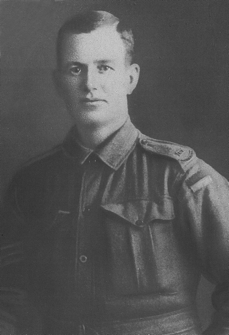WWI Stories – Sergeant Andrew Stewart Duncan
Beaufort
Andrew Palmer tells the story of his great-grandfather, Sergeant Andrew Stewart Duncan, and his service during World War One at Gallipoli and the Western Front.
Andrew Stewart Duncan enlisted on 20 August 1914 and embarked on the transport Ascanius from Adelaide on 20 October, 1914. His battalion was part of the covering force for the Anzac landing and among the first ashore at Gallipoli at 4:30am on 25 April.
 For the next 96 hours, the men of the 10th Battalion experienced continuous fighting, shattered nerves and little or no sleep. During the fighting, Andrew was reported missing. He was later found, with severe shrapnel wounds to his back. He was ferried from the beach out to the ship Ionian. Medical staff on the ship assessed the soldiers arriving: the dead or dying were to be placed in the hold of the ship, in a makeshift morgue. When Andrew’s condition was assessed he heard a voice say, “put him in the hold”. As Andrew was being taken to the morgue he managed to say, “give us a bloody drink”. Those words probably saved his life, as he was moved to lie with the wounded.
For the next 96 hours, the men of the 10th Battalion experienced continuous fighting, shattered nerves and little or no sleep. During the fighting, Andrew was reported missing. He was later found, with severe shrapnel wounds to his back. He was ferried from the beach out to the ship Ionian. Medical staff on the ship assessed the soldiers arriving: the dead or dying were to be placed in the hold of the ship, in a makeshift morgue. When Andrew’s condition was assessed he heard a voice say, “put him in the hold”. As Andrew was being taken to the morgue he managed to say, “give us a bloody drink”. Those words probably saved his life, as he was moved to lie with the wounded.
Evacuated to hospital in Egypt, Andrew later rejoined his battalion at Gallipoli in July 1915. He was promoted to Company Sergeant Major and remained at Anzac until the evacuation preparations began.
After the evacuation of Gallipoli, Andrew was shipped to France and took part in the attack on Pozieres on 23 July 1916. He was wounded in action and was sent to England, fortunate to have been hospitalized before the intense fighting to hold Pozieres and take Mouquet Farm. By the time the AIF was relieved at Pozieres in early September they had suffered more than 23,000 casualties; almost 7,000 dead or missing and 17,000 wounded.
Andrew made a slow recovery and was finally ready to return to duty in March 1917. He spent the next six months conducting officer training at camps in England and then rejoined his battalion in the mud and the mire near Passchendale just after the 3rd Battle of Ypres.
On the night of 1 March 1918, Andrew Duncan was reported missing in action, presumed captured. D Company was at Hollebecke, Flanders, just south of Ypres. The night was very dark. The 10th Battalion came under heavy shelling and the Germans raided D Company headquarters. Several men were captured, including Andrew. Their commanding officer was shot and killed.
Andrew was interrogated for an hour in the German trenches, then made to march for about 6 hours to a town behind the lines. He was interrogated, relocated, and then interrogated again.
He was held in a cell for about 17 days and daily interrogated – he thought that he was going to be killed. Andrew was then transferred between Prisoner of War camps, his final camp being Springhirsch in Schleswig-Holstein. He described the conditions as “unspeakably disgusting”.
After the war had ended, Andrew finally left Springhirsch camp in December 1918 arriving back in Australia on 29 June 1919.
Andrew called Victoria home after the war and married into a gold-mining family in Beaufort. Andrew must have found it a challenge to settle back into civilian life. He still carried the shrapnel from Gallipoli in his back, when the shrapnel moved he would have to take to bed for days or even weeks.
Read the full story here:





